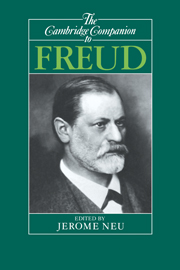Book contents
- Frontmatter
- Introduction
- 1 Freud: The psychoarcheology of civilizations
- 2 Seduced and abandoned: The rise and fall of Freud's seduction theory
- 3 Freud's androids
- 4 The interpretation of dreams
- 5 The unconscious
- 6 The development and vicissitudes of Freud's ideas on the Oedipus complex
- 7 Freud and perversion
- 8 Morality and the internalized other
- 9 Freud on women
- 10 Freud and the understanding of art
- 11 Freud's anthropology A reading of the “cultural books”
- 12 Freud's later theory of civilization
- 13 In fairness to Freud: A critical notice of The Foundations of Psychoanalysis, by Adolf Grünbaum
- Bibliography
- Cited works of Freud
- Index
- Series list
7 - Freud and perversion
Published online by Cambridge University Press: 28 May 2006
- Frontmatter
- Introduction
- 1 Freud: The psychoarcheology of civilizations
- 2 Seduced and abandoned: The rise and fall of Freud's seduction theory
- 3 Freud's androids
- 4 The interpretation of dreams
- 5 The unconscious
- 6 The development and vicissitudes of Freud's ideas on the Oedipus complex
- 7 Freud and perversion
- 8 Morality and the internalized other
- 9 Freud on women
- 10 Freud and the understanding of art
- 11 Freud's anthropology A reading of the “cultural books”
- 12 Freud's later theory of civilization
- 13 In fairness to Freud: A critical notice of The Foundations of Psychoanalysis, by Adolf Grünbaum
- Bibliography
- Cited works of Freud
- Index
- Series list
Summary
The first of Freud's Three Essays on the Theory of Sexuality is titled “The Sexual Aberrations.” Why should Freud begin a book the main point of which is to argue for the existence of infantile sexuality with a discussion of adult perversions? (After all, the existence of the adult aberrations was not news.) I believe Freud's beginning can be usefully understood as part of an effective argumentative strategy to extend the notion of sexuality by showing how extensive it already was. Freud himself (in the preface to the fourth edition) describes the book as an attempt “at enlarging the concept of sexuality” (1903d, VII, 134). The extension involved in the notion of perversion prepares the way for the extension involved in infantile sexuality.
The book begins, on its very first page, with a statement of the popular view of the sexual instinct:
It is generally understood to be absent in childhood, to set in at the time of puberty in connection with the process of coming to maturity and to be revealed in the manifestations of an irresistible attraction exercised by one sex upon the other,- while its aim is presumed to be sexual union, or at all events actions leading in that direction.
(1905d, VII, 135)- Type
- Chapter
- Information
- The Cambridge Companion to Freud , pp. 175 - 208Publisher: Cambridge University PressPrint publication year: 1991
- 2
- Cited by

